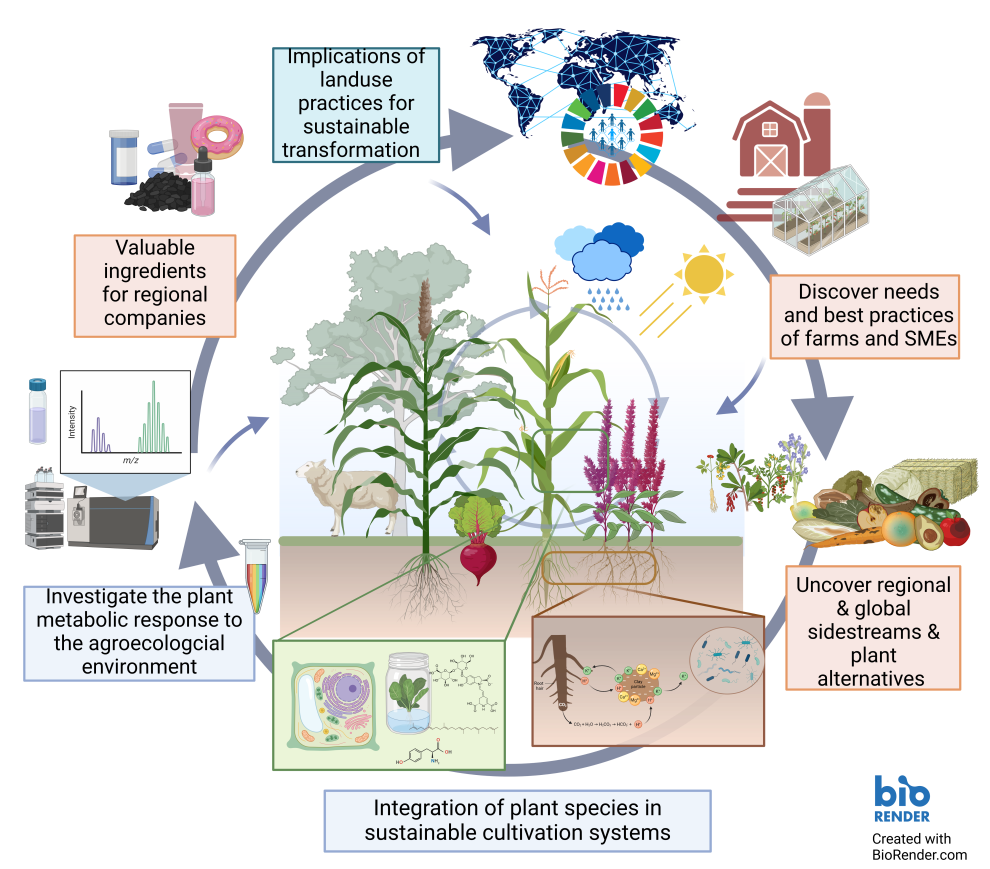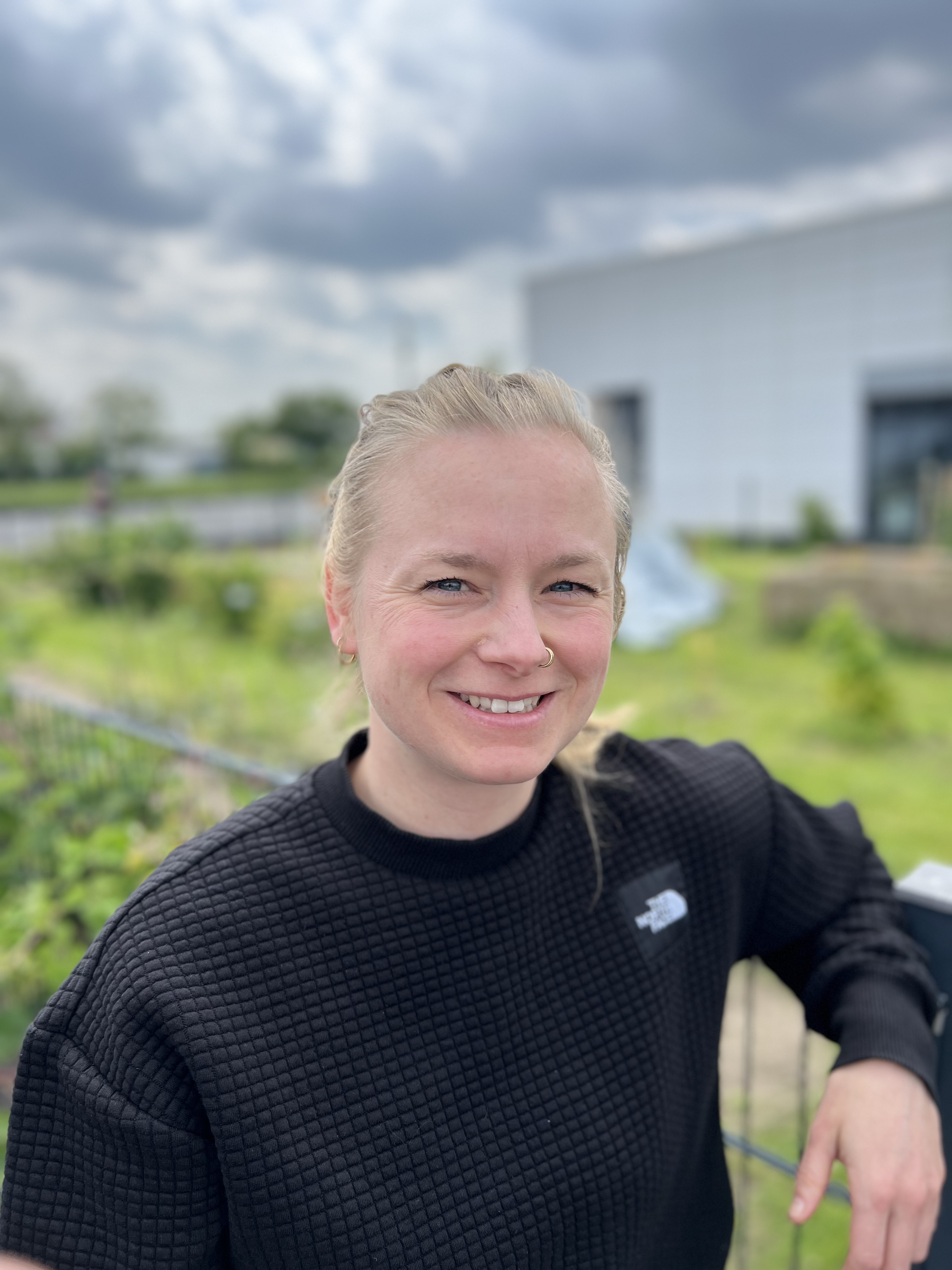Prof. Dr. Natalie Laibach
Sustainable Land Use Systems

Group Sustainable Land Use Systems
Sustainable transformation, i.e. respecting the physical planetary boundaries on the one hand and meeting the sustainability goals on the other, makes the interlocking design of research, teaching and transfer indispensable. The resulting overarching goal of the Chair of Sustainable Land Use Systems is to train people to become agents of sustainable transformation in a respectful and innovative environment. In order to achieve this, we employ the eponymous concept of sustainable land use systems from the perspective of usable plants embedded in regional and international value creation networks in an interdisciplinary manner.
Under this umbrella, we look into the interdisciplinary capacity of networks of farms, companies, etc. in the Lower Rhine region and beyond to examine the integration of underutilized species such as amaranth or sorghum into various utilization systems such as agrophotovoltaics, or agroforestry. Taking into account the digitalization of agriculture and alternative organizational concepts, the resilience and sustainability of these systems is scientifically examined. The optimized use and processing of bio-based raw materials is also an important component.
Plant adaptation to environmental conditions, which has developed from the sessility of these organs in the course of the adaptation of plants to environmental conditions, which has developed from the sessility of these organelles in the course of evolution, exhibits a distinctive diversity. In addition to morphological changes, biochemical and molecular biological processes play an important role, and allow short-term and precise reactions to changes in the environment. These processes influence how resilient the plant reacts to adverse environmental conditions, how it integrates into ecosystems and the composition of ingredients that can be used by humans. Accordingly, we test cultivated plants and useful wild plants under various cultivation conditions in the field and in the greenhouse, for example in the climate chambers of the tropical greenhouse. For this purpose we use biochemical and molecular biological analyses of relevant secondary metabolites (e.g. squalene, phytosterols, polyphenols, pigments) and on yield and resilience relevant genetic backgrounds.
Anyone interested in writing a Bachelor's or Master's thesis in these subject areas is very welcome.
Please contact: natalie.laibach@hochschule-rhein-waal.de

Biography
Born and raised in Essen, situated in the heart of the post-industrialised coal mining area, she developed an early interest in the principles of molecular biology. Consequently, she commenced her studies in biology and biosciences at the Universities of Tübingen and Münster, followed by a Master's degree in Biotechnology at the University of Münster and an Environmental Sciences degree from the Fern Universität Hagen. During this period, her interest in plants and their capacity to produce a fascinating variety of natural compounds was further stimulated. Consequently, she initiated research into the secondary metabolite production of Russian dandelion latex and the function of natural rubber storage proteins at the Fraunhofer Institute for Molecular Biology and Applied Ecology (Münster) in the Functional and Applied Genomics, concluding her Ph.D. thesis at the University of Münster in 2016.
As knowledge and technology transfer in facilitating sustainable transformation has always been a personal motivation, she moved to work in interdisciplinary projects at the Agricultural Faculty and Center for Development Research (ZEF), University of Bonn, focusing on sustainable biobased technologies and agricultural practices as well as the circular use of natural resources. She was involved in projects contributing to sustainability assessment and technology transfer related to agricultural innovation and the bioeconomy. Furthermore, she has been a researcher in the AGenT Marie Skłodowska-Curie COFUND programme at the Center for Research in Agricultural Genomics (Barcelona, Spain), including a research stay at the Max Planck Institute of Molecular Plant Physiology in Potsdam, Germany. During this period, she conducted research on sterol and terpenoid metabolism in plant development and stress responses, as well as brassinosteroid signalling in plant adaptation to climate change.
Furthermore, she collaborated with researchers from diverse disciplines and countries to optimise the sustainable utilisation of residuals from plant-based food production and consumption, as well as to develop teaching materials for seminars, lectures, practical courses and summer schools at various institutions. In addition to her academic pursuits, she is also engaged in the transfer of academic knowledge via communication and social engagement.
Her research and teaching interests encompass natural products derived from underutilised crop species, such as sorghum and amaranth, and their integration into sustainable agricultural systems. The molecular impact of environmental interactions on plants is a key focus, with an interdisciplinary approach always being employed.
Quicklinks
Kontakt
Prof. Dr. Natalie Laibach
Professorin für Nachhaltige Landnutzungssysteme
Tel.: (02821) - 806 73 - 9837
E-Mail: natalie.laibach@hochschule-rhein-waal.de
